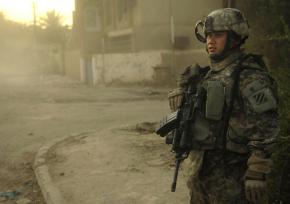Ten facts to remember about the Iraq War
With Trump ramping up military aggression on a number of fronts, highlights some key facts to remember about what the "achievements" of the Iraq war.
AS THE U.S. government prepares for new wars around the world, here are 10 things I think we should remember about the Iraq war:
1. All of the most respectable media outlets, including the New York Times, lied to the public about Saddam Hussein's supposed weapons of mass destruction (WMDs), helping to push the public into supporting the war. It's not the first time, nor is it the last time this will happen. Be prepared to be lied to again.
2. The war has resulted in 199,734 Iraqi civilian deaths--and still counting--according to Iraq Body Count.
In just the first three years of the conflict, 4.7 million Iraqis were displaced from their homes. Millions more have been displaced in the years since then. The war also resulted in the death of 4,424 American soldiers, and the injury of 31,952, according to the Department of Defense. Take a moment to let the scale of human suffering sink in.
3. As of 2013, the Iraq war cost taxpayers about $2 trillion, according to Reuters. The number is certainly higher as the war has continued.
But at the same time, the U.S. government has cut hundreds of billions of dollars from health care programs; closed schools, libraries and mental health clinics; and even cut Meals on Wheels for seniors because it just doesn't have the money, or so the politicians say. Could you think of a more productive way to use that $2 trillion?
4. The war took a massive toll on the environment. Use of depleted uranium caused an increased rate of cancer and birth defects. The destruction of Iraqi infrastructure turned the streets into open sewers, spreading disease. In many places, the water is undrinkable. Not to mention the enormous greenhouse gas emissions associated with the war.
5. American occupiers treated the Iraqi people just as brutally as any dictatorship, if not worse. The torture in places like Abu Ghraib is probably the most well known example. Homes were regularly broken into and ransacked in the middle of the night, family members were kidnapped and taken away to undisclosed locations, and pedestrians were run over and killed by Humvees as if their lives meant nothing.
6. Saddam Hussein was a brutal dictator, but he was able to build up his political, economic and military power in the 1980s with support from the U.S.
American foreign policy does not really distinguish between dictatorships and democracies. The main distinction it makes is between "friends" and "enemies." So some of the most ruthless governments in the world--Saudi Arabia, for example--are "friends," and regularly receive substantial economic and military aid.
At the same time, democratically elected governments are sometimes labeled "enemies"--like the government of Manuel Zelaya in Honduras, which was overthrown by a military coup in 2009, with the backing of then-Secretary of State Hillary Clinton.
There are many more examples, but given the history and current policy, why should anyone believe representatives of the U.S. government or military when they claim to be fighting dictators and promoting democracy? The government the U.S. currently backs in Iraq is a sectarian theocracy.
7. None of the strategic objectives of the Iraq war were actually achieved. The main outcomes of the war were: strengthening Iran in the region; fomenting sectarian strife--which was practically nonexistent before the war--culminating in the formation of ISIS; and keeping the U.S. bogged down in an endless conflict while China was able to build its economic strength throughout the world.
While I do not support the goals of U.S. imperialism, the war failed even on its own terms.
8. American soldiers resisted, forming Iraq Veterans Against the War, speaking out and going to prison for their refusal to fight. The civilian antiwar movement embraced the soldiers, taking up the slogan "Support our troops, bring them home."
We should remember soldiers like Camilo Mejia, Pablo Paredes, Kyle Snyder and Chelsea Manning, as well as military family members like Cindy Sheehan, who helped to lead that resistance. We should learn their stories and think about what motivated them to engage in such bold acts of civil disobedience.
9. You can never bring liberation and democracy to a country by invading and occupying it. That has never happened in history, and it certainly didn't happen in Iraq.
10. The point of studying history is to make the world a better place. If that's not the goal, then learning about the past is a pointless exercise. We need to remember what the powers-that-be want us to forget, so that we won't be fooled again.




